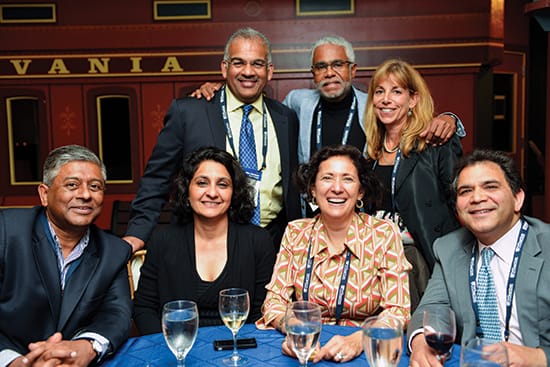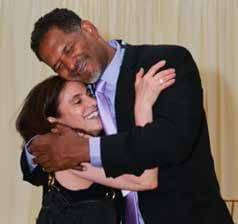
MBA Reunion attendees enjoy each other’s company at receptions and in the classroom.
Wharton Lifelong Learning ensures that alumni enjoy the benefit of remaining students and learning alongside their peers for life. This innovative, interactive educational programming is a primary reason alumni return to campus each spring for MBA Reunion. Or to put it another way, they attend the Lifelong Learning master classes to get the “squeeze” put on them by the likes of Michael Useem.
Not long into his Reunion master class on Friday, May 10—“Moving From Mid-Career to a Leadership Role”—Useem, the William and Jacalyn Egan Professor of Management, launched into the sort of interactivity that alumni have come to expect from Lifelong Learning. Useem called it: putting the “squeeze” on attendees. In this case, the squeeze involved the class breaking up into small groups and discussing the “late bloomers” they knew who grew from mid-management to leadership roles later in life. He reconvened the class and began calling on alumni around the room to share their discussions.
Useem, who also serves as director of the Center for Leadership and Change Management, had his own example of someone who took charge later in his career: Chile’s former Minister of Mining and Energy Laurence Golborne Riveros. Golborne is best known for his efforts to save 33 trapped miners in 2010, and it’s that experience that Useem homed in on. At the outset of the crisis, Golborne pledged to the miners’ families that he would do everything in his power to save the men (when he didn’t have the authority to do so) and then overcame the incredible geological and political obstacles to do so.

A Schedule for Everyone
The Wharton MBA Reunion and its Lifelong Learning programming again drew record attendance. How would they have built the rescue team if they were Golborne, Useem asked the alumni attendees. What made Golborne—a businessman who had been appointed to what otherwise would have been a behind-the-scenes government assignment—decide to become a leader on the global stage?
For those alumni attendees at the 2013 Wharton MBA Reunion who arrived early in Philadelphia on Friday, May 10, Lifelong Learning programming began with a keynote address by the Edward H. Bowman Professor of Management Katherine Klein, who now serves as vice dean of the Wharton Social Impact Initiative. Her new role informed her talk about the intersection of social impact and business, and she illustrated her lecture with stories about leading social entrepreneurs in the alumni community and researchers at the School.
Attendees also had the rare opportunity to discuss the future of the School and the University with their top leadership— during Friday’s Town Hall Meeting with Dean Thomas S. Robertson and Saturday’s “conversation” with President Amy Gutmann, HOM’04.
Plenty of time still existed in the MBA Reunion schedule for visiting old haunts on campus and reconnecting with friends during the pubs, picnics and dinners throughout the weekend. But build a schedule of educational and intellectually stimulating content for Wharton alumni, and they will come. So along with Useem’s well-attended master class, Russell E. Palmer Professor of Finance Jeremy J. Siegel’s Saturday morning lecture on the “Future for Investors” attracted more than 750 attendees. Other stimulating master classes included “Not-for-Profit Management” by Katherina Rosqueta, WG’01, executive director for Penn’s Center for High Impact Philanthropy; and Cecilia Yen Koo Professor of Operations and Information Management Maurice Schweitzer’s “Negotiating Negotiation”—among several others.
Assuming Uncomfortable Roles
Laura Huang, an assistant professor in Wharton’s Management Department, held her own version of the squeeze in her Reunion master class, “Switching Into Entrepreneurship.” She asked the alumni attendees to split into groups for role-playing, which placed participants into many different personas relevant in the entrepreneurial context.

Most importantly, the exercise put them into uncomfortable situations that many entrepreneurs face—such as when customers steal portions of code, founding team members disagree and investors force buy-backs. Entrepreneurship is about thinking through so many dynamically changing issues all at once, according to Huang. Yet when you are actually in these types of situations, you rarely have time to think. The goal of this master class and the role-playing simulation was to let the participants experience it firsthand in a safe environment. Then through the subsequent discussion, they gained a few key takeaways that hopefully got “embedded in their mental schemas and prototypes,” as Huang puts it. When they face similar situations in the future, they’ll have a “template” for how to react—almost instinctually in the face of the time demands and the uncertainty that they would face when they chart their own course as entrepreneurs.
Huang’s course was also meant to provide encouragement for alumni considering entrepreneurship for the first time. About 58 percent of her attendees possessed no entrepreneurial experience, according to Huang’s in-class survey.
As with any superior educational experience, Huang’s class left the “students” inspired. Useem’s master class left the attendees with profound questions to ask of themselves, friends and family members during the rest of their time at Reunion—and certainly beyond.
Editor’s note: Read more live highlights from Wharton MBA Reunion 2013 on our website at Web Exclusives.

























